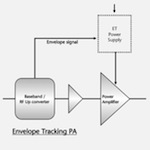
low power

Energy debugging – the next step in MCU software optimization
Winning the power and temperature battle with ESL exploration
Part 4- Power management in OCP-IP 3.0
According to Moore’s Law, system-on-chips (SoCs) should continually become more complex and integrate more components, enabled by each reduction in silicon technologies. However, power consumption does not follow the linear path implied here due to increasing leakage in deep sub-micron technologies. Hence, new power management techniques are needed to reduce power dissipation as much as […]
Extending UPF for incremental growth
Erich Marschner Accellera’s Unified Power Format (UPF) is in production use today, delivering the low-power system-on-chip (SoC) designs that are so much in demand. Building upon that success, IEEE Std 1801-2009 [UPF] offers additional features that address the challenges of low-power design and verification. These include more abstract specifications for power supplies, power states, and […]
A pulsed UWB receiver SoC for insect motion control
The article describes the context and need for embedded operating systems that are more responsive to the power management demands placed on today’s electronic devices. It reviews the design objectives for the two main types of power management, reactive and proactive, and examines how both can be implemented. For decades, scientists and engineers have been […]
Advanced RTL power-aware verification
Traditional verification tools struggle to deal with today’s increasingly sophisticated power management technologies. One major limitation is that they cannot deal with varying power states because they make a built-in assumption that devices are always fully powered on. Further, power-aware verification at the register-transfer level is proving increasingly problematic, although it is also becoming increasingly […]
Find your low-power path
Semiconductor vendors face increasing demands to lower power consumption. This trend has intensified in the last couple of years with the rejuvenation of the ‘green’ movement. In response, the industry has been getting smarter about low-voltage design, current-saving techniques for both the circuit and process levels, and coordinated power management. Meanwhile, programmers are concentrating on […]
The art of low-power physical design
The architectures that underpin today’s traditional place-and-route tools are showing their age, largely because their static timing analysis engines cannot handle more than two mode/corner scenarios. Thus limited, the software struggles to effectively implement low-power design techniques beyond such established concepts as clock gating and multiple threshold voltages. Designers run into difficulties when trying to […]
A holistic approach to low-power verification
The article describes a dedicated low-power functional verification methodology, originally developed at STMicroelectronics (now ST-Ericsson). The article details the content, sequence and effectiveness of the methodology as it was tested on a 45nm system-on-chip design. In order of use, the main components are: A high-level verification language testbench Formal verification Rule checking C function library […]
PLATINUM SPONSORS



View All Sponsors